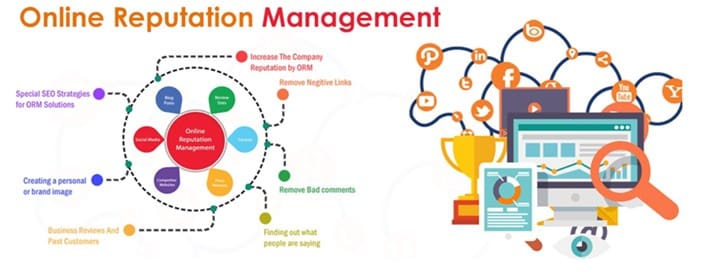From Dilemma to Chance: Leveraging Online Reputation Monitoring in Times of Misfortune
In today's interconnected and busy globe, people and companies deal with the continuous danger of situations and hardships that can potentially damage their hard-earned track record. In this conversation, we will certainly discover the art of leveraging online reputation management during times of crisis, providing insights and methods that can transform a difficult circumstance into a stepping rock for success.
Recognizing Online Reputation Monitoring
Recognizing online reputation monitoring is critical for individuals and businesses seeking to keep a favorable public picture and alleviate prospective damages in times of adversity. Reputation monitoring incorporates the strategies and strategies used to shape, keep, and secure a person's or company's online reputation (Reputation Management). It entails actively monitoring what is being said concerning the private or business, both online and offline, and reacting properly to any adverse or harmful information
In today's digital age, where details spreads out swiftly and can have a lasting influence, track record monitoring has actually ended up being much more vital. Social media platforms, online review sites, and information outlets can promptly enhance any kind of unfavorable publicity or criticism, potentially triggering substantial injury to an individual's or company's credibility. By comprehending track record management, companies and people can efficiently navigate these obstacles and proactively attend to any issues that may develop.
Trick elements of track record administration consist of keeping an eye on online states and evaluates, involving with consumers or stakeholders, resolving negative feedback or objection in a prompt and specialist manner, and proactively taking care of on the internet accounts and content. In addition, individuals and businesses must make every effort to build a strong track record by providing on promises, supplying outstanding client service, and involving in ethical methods.
Recognizing Hardships and Situation Circumstances

To identify these difficulties and situation situations, companies need to establish a durable monitoring and very early warning system. This includes proactively monitoring typical media, social networks platforms, online forums, and other pertinent resources for any negative conversations or potential dangers associated with the organization. Reputation Management. By remaining attentive and proactive, organizations can quickly spot and respond to arising problems, stopping them from spiraling unmanageable
Additionally, companies need to also carry out routine risk evaluations to identify possible susceptabilities and powerlessness in their operations. When they do occur, this permits them to develop backup plans and methods to address dilemmas efficiently. By being prepared and aggressive in recognizing adversities and situation situations, organizations can much better protect their track record, maintain stakeholder trust fund, and ultimately turn hardship into opportunity.
Building a Situation Action Approach
Developing an effective situation action approach is essential for companies to efficiently navigate through adversity and shield their track record. In times of dilemma, companies must be prepared to react rapidly and efficiently to alleviate the effect on their stakeholders and preserve public depend on. Constructing a dilemma action strategy involves a number of key actions.
To start with, organizations need to develop a crisis administration group consisted of crucial individuals from various departments. This team needs to be accountable for developing and applying the situation feedback plan. They must have a clear understanding view it of the organization's values, objectives, and key stakeholders.
Second of all, companies have to perform a comprehensive risk analysis to recognize possible situations that could occur and evaluate their prospective impact. This includes evaluating external and internal aspects that can lead to a situation, such as operational interruptions, monetary problems, or reputational threats.
Next, companies must develop an interaction plan that Discover More lays out just how they will certainly interact with their stakeholders during a situation. This strategy should include clear and consistent messaging, as well as platforms and channels to get to various audiences.
In addition, organizations should develop procedures for monitoring and reviewing the crisis action technique. This includes regularly assessing and upgrading the strategy to ensure its performance and making required adjustments based on lessons picked up from previous crises.

Utilizing Social Network in Credibility Management
Social media site has ended up being an integral device for organizations in managing their reputation during times of adversity. With the surge of social networking platforms such as Facebook, Twitter, and Instagram, companies currently have the chance to straight involve with their stakeholders and attend to any issues or concerns that may develop.
Throughout times of crisis, social media sites allows organizations to quickly share info, provide updates, and interact their side of the tale. By actively joining social media sites discussions, companies can keep track of public belief, address false information, and demonstrate openness and accountability.
Among the crucial advantages of making use of social media in online reputation monitoring is the capability to get to a big target market in real-time - Reputation Management. With social media platforms, organizations can involve with stakeholders from throughout the globe, despite geographical borders. This enables them to not only manage their credibility in your area yet additionally on a global range
An additional advantage of making use of social media sites is the interactive nature of these systems. Organizations can proactively pay attention to their audience, react to their problems, and show a willingness to solve concerns. This degree of involvement aids develop trust and credibility, which are critical for reputation monitoring.
Nevertheless, it is vital for organizations to approach social networks with care. Errors or unsuitable feedbacks can quickly escalate a situation and further damage the company's track record. Therefore, it is necessary for organizations to have a distinct social media strategy in position, with clear standards on just how to attend to crisis situations.
Transforming Dilemma Into Opportunity: Instance Studies
Several organizations have actually effectively turned situations into possibilities by successfully managing their track record and applying critical actions. These instance researches highlight the significance of proactive online reputation monitoring throughout times of misfortune.
One such study is the Tylenol crisis in 1982. When 7 individuals died after taking in cyanide-laced Tylenol pills, Johnson & Johnson took instant activity to safeguard its online reputation. The business quickly recalled 31 million bottles of Tylenol, reintroduced the product with tamper-proof packaging, and executed a transparent communication technique. By prioritizing customer safety and freely resolving the dilemma, Johnson & Johnson not just restored consumer count on but likewise set brand-new sector requirements for item safety and security.
One more notable instance is the Domino's Pizza dilemma in 2009. 2 workers shot themselves tampering with food in a Domino's kitchen and posted the video clip online. In reaction, Domino's quickly said sorry and introduced a thorough online project to address the dilemma. The company's CEO directly attended to the concern in a YouTube video clip, showing openness and dedication to consumer satisfaction. This positive method helped Domino's restore consumer trust and also enhance sales adhering to the event.
These study demonstrate the importance of swift activity, openness, and effective interaction subsequently dilemmas into possibilities. By efficiently managing their reputation and executing tactical activities, companies can not just alleviate the unfavorable effects of a situation yet additionally arise stronger and extra resilient.
Conclusion
Leveraging social media as a device in reputation management can even more enhance companies' ability to deal with situations and communicate with stakeholders. Via positive and tactical credibility administration, dilemmas can be transformed into possibilities for growth and renovation.
By being prepared and proactive in determining misfortunes and crisis circumstances, organizations can much better secure their online reputation, keep stakeholder trust fund, and eventually transform hardship into chance.
Creating an effective situation feedback technique is essential for companies to efficiently navigate through misfortune and protect their track record. Missteps or inappropriate responses can rapidly intensify a situation and additional damage the organization's credibility. Leveraging social media as a device in track record management can additionally boost companies' capability to deal with crises and interact with stakeholders. With positive and critical credibility administration, crises can be turned into opportunities for growth and learn this here now renovation.